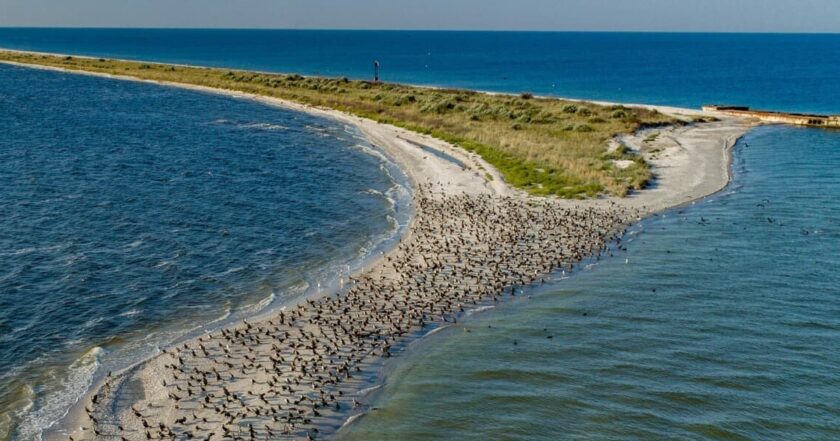Global food security hinges on a tiny piece of land occupied by russia

More than a year into russia's full-blown war on Ukraine, the Black Sea grain corridor – the only agreement that, despite bitter fighting, the two foes managed to keep open – is at risk of being suspended, with grave potential consequences for global food security.
russia's invasion of Ukraine caused disruption in the world food supply chains. On 22 July 2022, the United Nations brokered two separate treaties between russia and Ukraine, which resulted in the opening of the Black Sea corridor or the Grain deal initiative. For leaders in Kyiv at the time, it was crucial to demonstrate defiance of russian coercion, and signing a multilateral deal with moscow was politically impossible given how fragile the trust between the two parties was, so UN patronage was needed.
The first stage of the deal was meant to last for 120 days, which was later renewed on November 17 for the same period. This means the agreement now expires on March 18. Ukraine's officials have kept the door open to extend that period for another year, but it is unlikely that russia will agree to such a proposal now so that putin can maintain an ace up his sleeve.
Since the agreement began, ships carrying 22.5 mln tonnes of corn, wheat and sunflower oil have left Ukrainian ports. It is vital for keeping the state afloat, as 30% of the country's budget is supplied by Ukraine's trade partners. However, for the past couple of months, according to the UN-backed Joint Coordination Center, which consists of representatives from Ukraine, russia, Türkiye, inspections have severely delayed the actual shipment of food. Overall, Ukraine is the top exporter of corn, wheat and sunflower oil in the world.
Vysotskyi Taras, Ukraine's first deputy minister of agrarian policy and food notes that as of now, 2.5 ships on average are coming through the Bosphorus Strait and suggests that this estimate may not account for russian inspectors' sabotage.
That said, Ukraine argues that russia is reducing the number of inspectors involved. Ukraine's officials have been calling to speed up those inspections as the losses from such delays severely impact its export revenue. The reduced-capacity Black Sea corridor agreement allows Ukraine to export only 30% of all grain that could potentially be shipped. That means that a month of waiting costs about $20 per ton – meaning that for each ship carrying 35 thousand tons of wheat, the losses could amount to $700,000 dollars in a month, not to mention reputational costs for the exporter.
One of the few problems with the inspections' delay is that it includes only three of Ukraine's ports: Odesa, Chornomorsk, and Pivdennyi. All of them are located in the Odesa region. One way to solve this issue is to include additional ports in the Initiative. Ukraine would like to change the current status quo and include two or at least one of its ports in neighboring Odesa, Mykolaiv region. The Kinburn Spit remains the only part of the Mykolaiv region under russian control. In order to pass through to Odesa or directly to Bosphorus, any ship would need to pass through this tiny passageway, where the Ukrainian military cannot guarantee its safety.
The major issue with Kinburn Spit was that its control allowed russia to launch missiles on Ukraine's Black Sea shore from time to time, particularly at the Ukrainian city of Ochakiv, once a Turkish fortress in the 18th century.
Mykolaiv's premiere agricultural company Nibulon already lost around 88% of its export capacity as the usual port of Mykolaiv has no free and safe pass to serve trade purposes. Adding Mykolaiv ports is crucial for the industry, which suffered tremendous losses following the loss of receiving credit lines from abroad due to russia stealing grain. It is also important to mention that Ukraine's ability to control Snake Island became essential in negotiating the Grain Deal.
In that sense, one way is to negotiate safe passage with the russians, which will likely leave more questions than answers, as it will require direct contact between Kyiv and moscow officials, and any negotiation is a non-starter for Ukraine after putin proclaimed the annexation of four of Ukraine's regions. In November, when the first stage of the Grain Deal expired, US officials assured Kyiv it would consider establishing a 20-mile buffer zone between Romania and Turkey to safeguard ships from russia's attacks, but this idea has not gone far.
Vitaliy Kim, head of the Mykolaiv regional military administration, confirms that Mykolaiv ports are ready to be included into the deal. However, russians need to greenlight this adjustment. As for now, Russians control the Dnipro-Buh estuary from the Kinburn Spit, which makes the ships' passage impossible.
As President Biden said during his visit to Warsaw, vladimir putin has shown his willingness to hold the world's food supply hostage to succeed in his adventures in Ukraine. Those ambitions would have succeeded if russia had managed to get past Kherson in early March 2022 to Mykolaiv and Odesa, but putin has downsized those aspirations since last year.
Adding Mykolaiv's port to the Grain Deal would also account for a new reality that acknowledges Ukraine's successful counteroffensive in the Kherson region. The Kinburn Spit is a unique geographic location, with a sea connection with Ochakiv in Mykolaiv region, and a land connection with other parts of the Kherson region, which still remains under russian control. Liberation of those parts in Kherson lands through the Kinburn is the fastest way for Ukraine's army to re-establish its control of the waterway.
According to Major General Dmytro Marchenko, who was in charge of the battle that kept Mykolaiv under Ukraine's flag, it is extremely difficult for Ukraine's armed forces to catch russians at the Kinburn Spit off guard. So it would be wise to assume long-range missiles for Ukraine are needed to force the russians out of the peninsula. What is more, pushing russians back will be a step toward freeing Crimea from russian occupation, which is crucial for Ukraine's vision of victory.
For the moment, the major focus of international attention has been shifted to Ukraine's brave defense of the city of Bakhmut, which russians tried to encircle with everything they had. But the southern front is another important area where western aid, including US military assistance, will be used too. The liberation of the Kinburn Spit could lay a foundation for the resumption of Ukrainian grain exports via the Black Sea and will be a decisive step in liberating all of Kherson, the Crimean Peninsula, and eventually, all of Ukraine.



















































